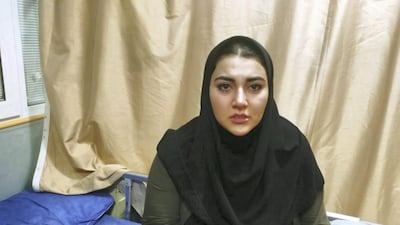Ana Diamond, a British-Iranian dual citizen who was sentenced to death by Iran’s clerical court at only 19, has spoken out about her experiences as she seeks redress through the UK Parliament.
Her prosecutors — including Iran’s current president — accused the teenager of spying for MI6, the CIA and Mossad.
Along with her parents, she was incarcerated in Iran’s notorious Evin jail, held in solitary confinement and tortured.
But her arrest, interrogation and trial were all a bargaining mechanism, part of Iran’s approach to hostage diplomacy, she told The National.
Ms Diamond said she was used to exert leverage on the British government to pay the £400 million it owed Iran for a 1970s tank deal.

That money has now been paid, with the regime’s high-profile hostage, Nazanin Zaghari-Ratcliffe, released in March.
Ms Diamond is now part of a British parliamentary investigation into state hostage-taking by Iran and has given evidence before the Foreign Affairs Committee.
She spoke to The National about her imprisonment and subsequent torture and how being given the death penalty has left her with a legacy of suffering and anxiety that has plagued her for years
Tehran airport, 2014
“Where did you get this passport from?” the official demanded, as he examined the 19-year-old’s Iranian documents with suspicion.
“The Iranian embassy in London,” Ms Diamond replied.
More officials were summoned. The teenager was questioned for hours and then her Iranian and Finnish passports, laptop and phone were all confiscated.
At the arrivals hall, her mother waited anxiously until, several hours after landing, her daughter appeared, distressed and without her documents or computer.
The family had no idea that they were to become pawns in a political game that would scar the lives of many Iranian-British citizens for the next decade.
The intern
Ms Diamond and her family arrived in Britain when she was 14 after spending nearly a decade in Finland where her father, a scholar, had fled from Iran in 1999.
Barely speaking English, she began studying A Levels at Westminster College in London and developed an interest in politics, becoming the city spokeswoman for Young Conservatives. She even assisted Boris Johnson in his 2012 mayoral campaign.
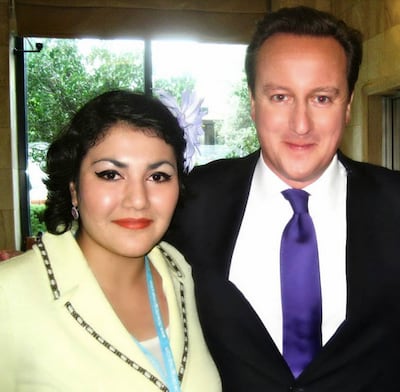
She helped out at Conservative Central HQ during her first year at King’s College London, where she read film and media studies with theology, mingling with the Tory hierarchy including David Cameron, Theresa May and William Hague.
Her upward trajectory continued after she won a sought-after internship with Richard Harrington, MP starting in September 2014.
In July 2014, she made the long journey back to Tehran via London after a term at the University of California and was joining her parents to visit her grandmother and deal with a family business.
It was then that her life irrevocably changed.
Arrest
Four months after her airport detention, Ms Diamond received a phone call from an officer in the Islamic Revolutionary Guards Corps, ordering her to attend an interview.
It was clear to Ms Diamond that officials had been through all the pictures and documents on her laptop, including those of her playing rugby.
Why did she play rugby, they demanded? Did she like being aggressive on the field?
“They were trying to create a narrative that I was being indoctrinated to be a spy, that I was athletic and I could tackle people if needed,” she said.
“At the time I just thought, maybe it’s because they think women should do tennis or ballet?”
In January 2016, after months living under a travel ban, Ms Diamond had received an internship with the UN in Tehran and was walking into work when a van stopped in front of her. Two men with handguns got out and she was forced inside.
With her head forced down between her knees, she was driven to the Special Clerical Court.
The Diamonds — who have changed their surname — came from a family that was active in the Iranian Revolution.
Ms Diamond's grandfather was Ayatollah Gholamreza Hassani, possibly the most conservative voice in Iran, to the point that in 1983 he reportedly revealed the hiding place of his eldest son, Rashid, who had joined a leftist opposition guerrilla group.
His son was executed by firing squad with his father’s approval.
“Abraham didn't sacrifice his son, but I did,” Hassani was frequently quoted as saying.
Ms Diamon discovered in court that her links to senior British Conservative figures, her sports skills and study in London were enough evidence to brand her an MI6 spy. She was charged with espionage and jailed.
Evin prison
After the hearing, Ms Diamond was put on to a prison van headed to the notorious Evin high-security prison, where she was put in the same block as Ms Zaghari-Ratcliffe.
She was held for more than 200 days in solitary confinement in a concrete cell with no window and no phone calls allowed to her family or a lawyer.
On her laptop, Iranian officials had found pictures of Ms Diamond looking rugged in a combat uniform and carrying a gun with a “Delta Force” flag in the background.
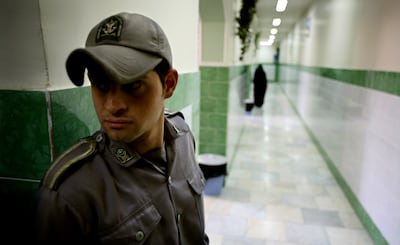
“This is clearly a Nato field-training sessions before you go on operations!” an official shouted at her during an interrogation.
Ms Diamond pointed to the blotches of yellow and red on her uniform and the odd shape of the gun.
“It’s paintballing,” she said.
She was forced to sit facing a wall for hours on end or to assume “stress positions”, kneeling with arms outstretched. The pain was at times excruciating but Ms Diamond was adamant that she would not tell any lies.
“To do a false confession for them would backfire on me and my parents as well.”
The solitary confinement and endless questioning took their toll, causing- her to develop an arrhythmia.
Death sentence
In May 2016, the prosecutor told her that because she had not been co-operative, he was taking the case forward for sentencing.
She was given the death penalty.
Ms Diamond immediately fought back.
“But you know that I haven’t done this,” she argued.
“Well, if you're innocent, then your place will be in paradise,” he replied.
It later appeared that Tehran was using the sentence as leverage for the £400m British debt as well as other outstanding diplomatic disputes. But that didn’t help Ms Diamond.
“The death penalty was really spine chilling. I was scared. It was insane and sadistic but I knew I had to work harder to get the right result,” she said.
She also knew the prosecutor would have no issue executing a teenage girl.
“People’s lives for him are just collateral. He would not spare a life at the expense of preserving the legitimacy of Islamic Republic,” she said.
“He's read all the begging letters for clemency, ignored them and learnt how to live with it.”
Raisi prosecution
Ms Diamond was twice cross-examined by Ebrahim Raisi, now the president of Iran.
“He struck me as uncharismatic and an indifferent man of no substance,” she said.
When she later saw his face on election posters, she was shocked.
“It was a very surreal feeling, thinking about what this man has done, that he has taken such an active role in so many potential human rights violations and yet he is put forward as this ideal candidate.”
Mr Raisi became president in 2021.
“He’s essentially a devoted ‘yes man’ to the revolution. Since his twenties, he’s learnt on the job and other people paid for his mistakes.
“I see him as an instrument to the Revolutionary Guards.”
Night meeting
Her court-appointed lawyer had told her it would be difficult to reverse her death sentence, but Ms Diamond was undaunted — knew she was innocent.
“I just thought this is a moment to prove myself.”
The death sentence was quashed in December 2016 and commuted to 10 years in jail, although she was allowed out on bail.
But the chances of Ms Diamond's father being executed increased after he was transferred to another prison where death sentences were often carried out.
Terrified, she contacted an influential family friend who drove her to the north of Tehran. She was transferred to another car, which a suited man later entered.
The suited man was the head of Evin prison, the one who had authorised Ms Diamond's violent interrogations.
“I told him I'm really concerned for my dad and that I don't want him to be transferred. I had to play along the whole time that he was superior, I was inferior. It was humiliating and they enjoy the dynamic of ‘I am the authority’, it’s a power trip for them. Ultimately, they made decisions on our lives”
But the humility worked.
“I will make sure your father is in a safe place he won’t get hurt,” he told her.
Supreme leader
Ms Diamond wanted her name cleared but that authority could only come from the very top: Supreme Leader Ayatollah Ali Khamenei.
In the summer of 2017, she went to his office in central Tehran and asked for an audience.
“The receptionist said, ‘I'm so sorry we can't let you in’, and I said ‘well I'll sit here until someone comes.'”
For three days, she sat in the office, from morning to night.
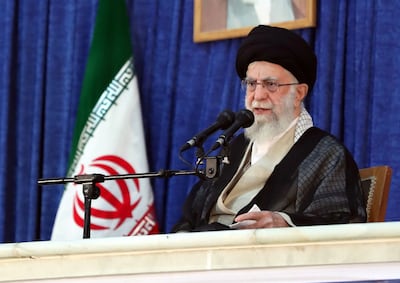
Eventually an official approached, telling her to leave.
“I've been in Evin prison so I'm not scared of anything,” she told him.
She was finally was brought before the head of legal affairs, whom she described as kind and generous.
“You know that there can be misunderstandings because of political tension,” he said. “People that shouldn't be ensnared in such circumstances get entangled.”
He told her he was a close friend of the appeal judge appeal courts judge, and Ms Diamond's spirits rose.
But there was a catch.
“Would you be willing to meet my son?” the man asked.
And Ms Diamond realised that the price for her father's freedom might be her marriage.
Escape
Ms Diamond received the call she had been waiting weeks for after Boris Johnson visited Iran in November 2017.
While the family had no direct contact with the then-foreign secretary, it is understood that he did discuss British prisoners being held by Iran.
A few weeks later, Ms Diamond was acquitted and when her travel ban was lifted in May 2018, she took her chance, obtaining an emergency passport and fleeing the country.
Back in England, she was on her own with her parents still stranded in Iran. She was in a “mentally very dark place”, suffering post-traumatic stress disorder due to years of mental and physical torture.
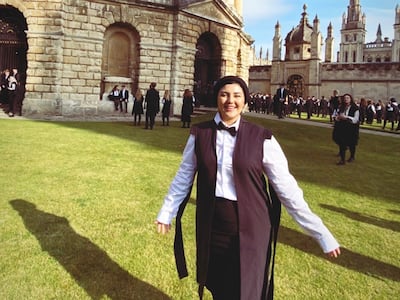
Ms Diamond, now 26, co-founded the Alliance Against State Hostage-Taking and has worked closely with Hostage International, an organisation that monitors the mental health of those captured by states or terrorists.
She hopes her evidence will help the UK develop a policy against Iran’s state hostage-taking.
“Iran has sought to use detainees’ foreign citizenship to gain leverage in disputes or negotiations with the relevant country,” her statement to Parliament stated. “The practice is now being carried out under the cover of law.”
Ms Diamond, who received a scholarship for postgraduate studies at the University of Oxford, was put in touch with former Beirut hostage Sir Terry Waite, who has acted as a mentor, helping her through her trauma and supporting her as she works to use her experiences for a purpose.
“The hostage ordeal stole four years of my youth, left me chronically in pain and permanently disabled,” she said. “Our lives were utterly changed by the inhumane and unjustifiable behaviour of the Revolutionary Guards.”
